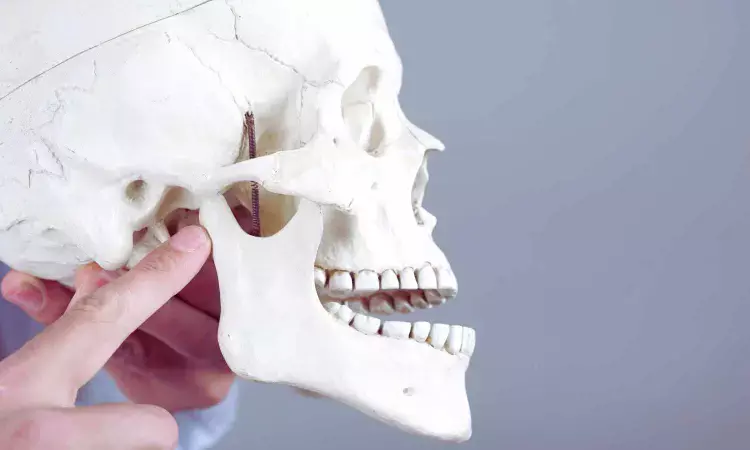- Home
- Medical news & Guidelines
- Anesthesiology
- Cardiology and CTVS
- Critical Care
- Dentistry
- Dermatology
- Diabetes and Endocrinology
- ENT
- Gastroenterology
- Medicine
- Nephrology
- Neurology
- Obstretics-Gynaecology
- Oncology
- Ophthalmology
- Orthopaedics
- Pediatrics-Neonatology
- Psychiatry
- Pulmonology
- Radiology
- Surgery
- Urology
- Laboratory Medicine
- Diet
- Nursing
- Paramedical
- Physiotherapy
- Health news
- Fact Check
- Bone Health Fact Check
- Brain Health Fact Check
- Cancer Related Fact Check
- Child Care Fact Check
- Dental and oral health fact check
- Diabetes and metabolic health fact check
- Diet and Nutrition Fact Check
- Eye and ENT Care Fact Check
- Fitness fact check
- Gut health fact check
- Heart health fact check
- Kidney health fact check
- Medical education fact check
- Men's health fact check
- Respiratory fact check
- Skin and hair care fact check
- Vaccine and Immunization fact check
- Women's health fact check
- AYUSH
- State News
- Andaman and Nicobar Islands
- Andhra Pradesh
- Arunachal Pradesh
- Assam
- Bihar
- Chandigarh
- Chattisgarh
- Dadra and Nagar Haveli
- Daman and Diu
- Delhi
- Goa
- Gujarat
- Haryana
- Himachal Pradesh
- Jammu & Kashmir
- Jharkhand
- Karnataka
- Kerala
- Ladakh
- Lakshadweep
- Madhya Pradesh
- Maharashtra
- Manipur
- Meghalaya
- Mizoram
- Nagaland
- Odisha
- Puducherry
- Punjab
- Rajasthan
- Sikkim
- Tamil Nadu
- Telangana
- Tripura
- Uttar Pradesh
- Uttrakhand
- West Bengal
- Medical Education
- Industry
Mandibular Devices Effective for Severe Sleep Apnea with Hypertension: Study

Researchers have identified in a new study that mandibular advancement devices (MADs) are a valuable and acceptable treatment for patients with severe obstructive sleep apnea (OSA) and hypertension, offering significant improvements in sleep-related quality of life and blood pressure. Although continuous positive airway pressure (CPAP) is currently the gold standard treatment, this study demonstrates that MADs have cardiovascular benefits and improved patient compliance, and they can be an alternative in clinical practice. The study was published in the Journal of Dental Research by J. T. Colpani and fellow researchers.
This randomized trial substudy comprised 144 patients with severe OSA, who were assigned to MAD (n=73) or CPAP (n=71) treatment for 12 months. Measured outcomes were ambulatory BP, apnea-hypopnea index (AHI), quality of life related to sleep, cardiac MRI indexes, heart rhythm, biomarkers, and adverse events. Median nightly use was 5.4 hours (2.9–6.5) for MAD and 4.9 hours (4.0–6.0) for CPAP, with 56.1% of MAD users and 28.3% of CPAP users having ≥6 hours/night adherence.
Results
• The AHI at baseline was 44.0 events/h in the MAD group and 50.7 events/h in the CPAP group.
• At 6 months, AHI reduced to 20.9 events/h with MAD and 2.1 events/h with CPAP.
MAD treatment reduced significantly:
• Asleep mean BP: −4.7 mm Hg (95% CI: −8.3 to −4.0; P = 0.015)
• Asleep systolic BP: −2.0 mm Hg (95% CI: −10.0 to −4.0; P = 0.047)
• Asleep diastolic BP: −4.0 mm Hg (95% CI: −9.0 to −3.0; P = 0.007)
Between-group differences benefited MAD compared with CPAP for:
• Asleep mean BP: −3.70 mm Hg (95% CI: −7.40 to 0.00; P = 0.050)
• Asleep systolic BP: −4.78 mm Hg (95% CI: −9.51 to 0.04; P = 0.048)
• Both therapies enhanced quality of life related to sleep, but CPAP had a slightly greater effect on the Epworth Sleepiness Scale (Δ1.63; 95% CI: 0.45 to 2.81; P = 0.007).
•There were no significant alterations in cardiac MRI parameters, ambulatory heart rhythm, or biomarkers for either group.
Adverse effects varied:
• MAD users: jaw pain (14.8%), discomfort of teeth (8.2%)
• CPAP users: dry mouth (50.8%), nasal congestion (23.0%), air leakage (29.5%)
This randomized study proved MADs to be an effective and acceptable substitute for CPAP in the case of patients with severe OSA and hypertension, especially for nocturnal blood pressure improvement and compliance. Although CPAP is still better at the suppression of apnea events, MADs can have larger cardiovascular benefits and are a valuable treatment strategy in the practice setting.
Reference:
Colpani, J. T., Ou, Y.-H., Kosasih, A. M., Lee, F. K. F., Chan, S.-P., Tan, H. H., Wong, R. C. W., Chin, C. W., Cistulli, P. A., & Lee, C.-H. (2025). Mandibular advancement device versus CPAP in severe obstructive sleep apnea. Journal of Dental Research, 00220345251361796. https://doi.org/10.1177/00220345251361796
Dr Riya Dave has completed dentistry from Gujarat University in 2022. She is a dentist and accomplished medical and scientific writer known for her commitment to bridging the gap between clinical expertise and accessible healthcare information. She has been actively involved in writing blogs related to health and wellness.
Dr Kamal Kant Kohli-MBBS, DTCD- a chest specialist with more than 30 years of practice and a flair for writing clinical articles, Dr Kamal Kant Kohli joined Medical Dialogues as a Chief Editor of Medical News. Besides writing articles, as an editor, he proofreads and verifies all the medical content published on Medical Dialogues including those coming from journals, studies,medical conferences,guidelines etc. Email: drkohli@medicaldialogues.in. Contact no. 011-43720751


